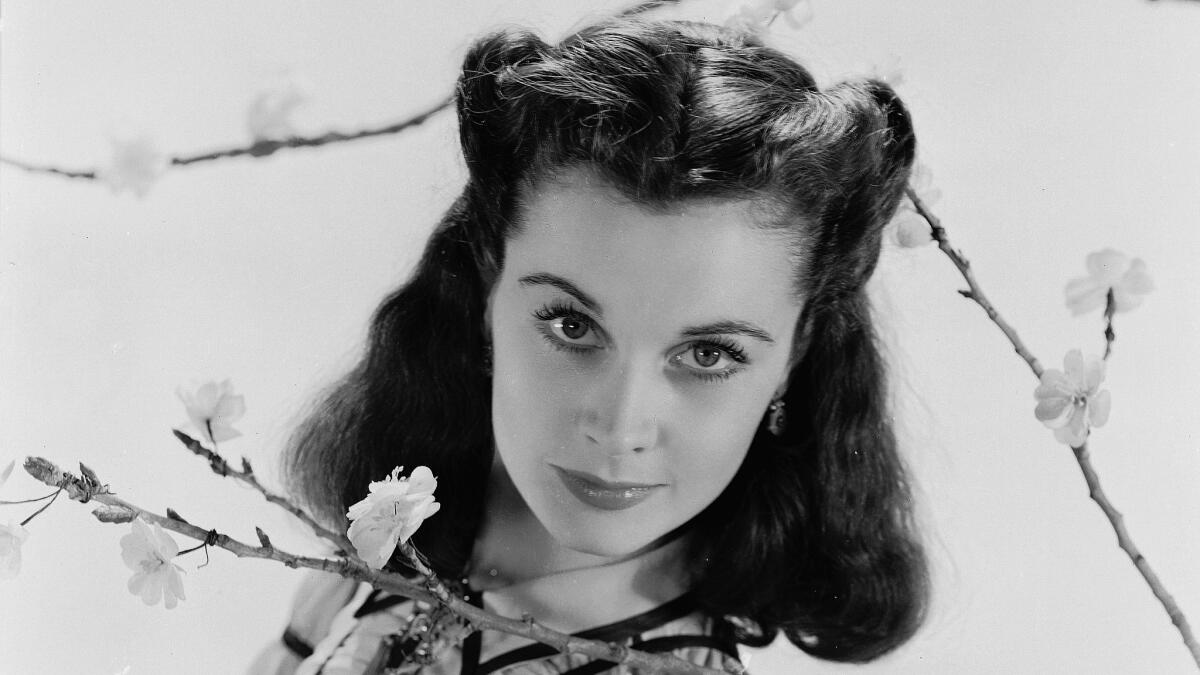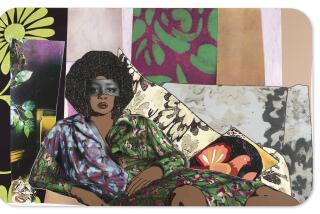From the Archives: Vivien Leigh, ‘Gone With the Wind’ Star, Dies at 53

Vivien Leigh was an Academy Award winner for her role as Scarlett O’Hara in “Gone With the Wind.”
Vivien Leigh, the tiny, frail actress from the Himalaya Mountains who won enduring fame for her fiery film performance as Scarlett O’Hara in “Gone With the Wind,” died Saturday in London.
The 53-year-old two-time Academy Award winner was found dead in bed in her apartment in the fashionable Belgravia district. Dispatches from London gave no official cause of death.
However, Miss Leigh was stricken a month ago with a recurrence of tuberculosis, an illness that had plagued her for nearly a quarter of a century. She had appeared to be recovering from the latest attack.
Second Oscar in ‘Streetcar’
Miss Leigh won the first Oscar in 1940 for her portrayal of Scarlett. She won the second Oscar 12 years later for her performance in “A Streetcar Named Desire.” Her last American film was “Ship of Fools,” released in 1965.
George Cukor, who directed Miss Leigh in the first part of the famed Civil War epic, said he had received a telegram from her Friday congratulating him on his birthday.
“It was a most charming telegram,” he said. “This is very sad news, very tragic, very upsetting.”
Actress Olivia de Havilland, the only survivor of the four principal stars of “Gone With the Wind,” burst into tears when informed of Miss Leigh’s death.
“Oh, my God. How did she die?” said Miss de Havilland. “I don’t think I can say anything.”
Miss Leigh’s death brought similar exclamations of shock and sorrow from around the world from persons who had known or worked with the 5-foot-3, 100-pound actress, honored as one of Britain’s greatest contemporary women performers.
Marquee Light Extinguished
All theaters in London’s West End extinguished their marquee lights for an hour Saturday night in honor of her memory.
Sir Laurence Olivier, Miss Leigh’s husband for 20 years until their divorce in 1960 and a key link in the chain of events that gave the actress the role of Scarlett, went to Miss Leigh’s apartment when he learned of her death. He left 30 minutes later without comment.
Miss Leigh’s recent tuberculosis attack came as the red-haired actress was to start rehearsals for the London stage production of Edward Albee’s play, “A Delicate Balance.”
It also came as Metro-Goldwyn-Mayer was preparing for the sixth national release (on Oct. 11) of “Gone With the Wind,” the most popular — and biggest money-maker film — of all time.
In its five previous releases since 1939, the film earned more than $35 million. Miss Leigh received a flat fee of $20,000 for the role of Scarlett.
“I wouldn’t have objected to just a little bit of the percentage (of the film’s income),” she later remarked ruefully.
Her selection for the Scarlett role has become embedded in the folklore of Hollywood.
When producer David O. Selznick decided to film the Civil War novel by the late Margaret Mitchell, a worldwide search was launched for a woman to play the role of the tempestuous Southern belle.
Sought Fiery Star
“The girl I select,” said Cukor, who was later replaced as director by Victor Fleming, “must be possessed of the devil and charged with electricity.”
She needed also to be the physical counterpart of the diminutive, slender heroine in the film version of Miss Mitchell’s novel starring Clark Gable as Rhett Butler.
The quest triggered feminine dreams of glamor, wealth and fame around the world. And at least 1,400 women who felt they matched the requirements, physical and psychological, submitted applications to the studio.
Even such famous and established stars as Carole Lombard and Paulette Goddard were in the running.
But the part went to a relatively unknown English actress of 26 who flew to Hollywood to visit her sweetheart, Sir Laurence, then starring in the film, “Wuthering Heights.”
Olivier introduced her to agent Myron Selznick, who in turn introduced her to Myron’s brother, the producer, with the comment:
“Meet Scarlett O’Hara.”
Olivier later took Miss Leigh to the Selznick lot, where about 100 Hollywood notables had gathered to watch the filming of the flaming destruction of Atlanta by Union troops.
Production of the epic had gotten under way despite the absence of a star for the top feminine role, a factor that heightened excitement among the hopefuls.
Miss Leigh later recalled the moment of her selection in a magazine article:
“Mr. Selznick, watching me in the flickering light, decided I was Scarlett’s physical type.”
Her selection brought groans of disappointment from the other contenders, and the threat of a boycott of the film from the Ocala, Fla., Daughters of the Confederacy. They protested that only a native Southerner should have the role.
Miss Leigh found Scarlett an unsympathetic character. “A silly girl, in the sense that all self-centered people are silly and blind,” she said in appraisal in the closing days of filming. But Scarlett earned Miss Leigh an Oscar.
Miss Leigh, a versatile actress equally at ease with light frothy roles, played other unsympathetic Southern women in her later important American films.
She portrayed the faded, neurotic Blanche du Bois in “A Streetcar Named Desire” and an alcoholic in “Ship of Fools.”
Despite her long battle against tuberculosis, Miss Leigh frequently displayed off-screen high spirits that would have won Scarlett’s approval.
Ousted by Lords
In 1953, she draped a cobra (its poisonous fangs removed) around her neck in a visit to India. Several years later she was ejected from Britain’s House of Lords after interrupting a debate to protest the planned demolition of the St. James Theater.
Miss Leigh was born November 5, 1913, in Darjeeling, a city in India at the foot of Mt. Everest. Her father, Ernest E. Hartley, was a Calcutta stockbroker of French descent. Her mother was Irish.
She was educated in a Bavarian convent and at finishing schools in England and continental Europe. At 19 she married London barrister Herbert Leigh Holman. The couple had one child, Suzanne.
They were divorced in 1940.
Studying or working at her profession since she was 14, Miss Leigh made her London stage debut in 1935.
She met Olivier, who is now married to actress Joan Plowright, when they performed in Shakespeare’s “Hamlet” in 1935. They later appeared together in numerous plays.
She appeared in more than 10 films.
Born Vivian Mary Hartley (she changed the A to E in the first name “because it sounded more feminine”), she used her first husband’s middle name for her career. But it will be as Scarlett O’Hara that she will be remembered.
More to Read
Start your day right
Sign up for Essential California for the L.A. Times biggest news, features and recommendations in your inbox six days a week.
You may occasionally receive promotional content from the Los Angeles Times.






